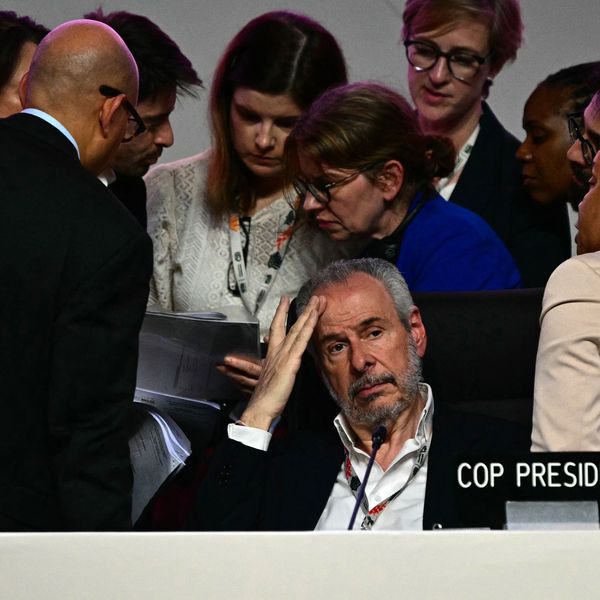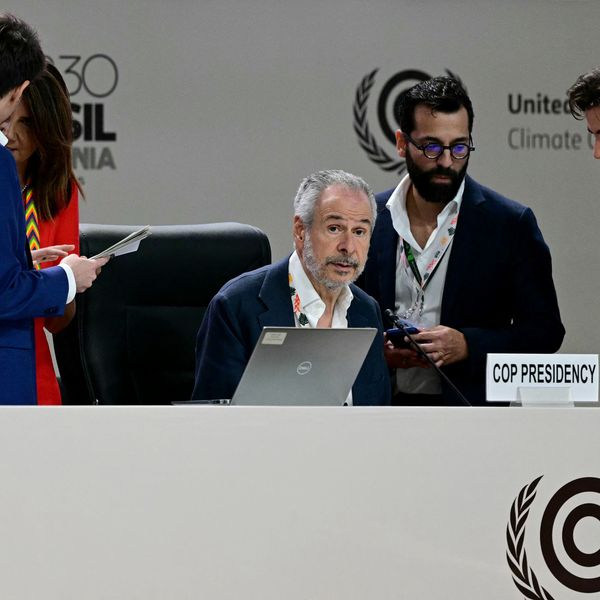Despite Pope's Call to Climate Action, Churches Hold Millions in Fossil Fuels
'This home of ours is being ruined and that damages everyone,' said Pope Francis in June
Pope Francis's bold call to tackle climate change and save the planet appears to conflict with U.S. Catholic churches' millions of dollars of investments in fossil fuels industries, including fracking, a new Reuters report shows.
Journalist Richard Valdmanis combed through church disclosures and portfolios. They found: "Dioceses covering Boston, Rockville Center on Long Island, Baltimore, Toledo, and much of Minnesota have all reported millions of dollars in holdings in oil and gas stocks in recent years."
"The holdings tend to make up between 5 and 10 percent of the dioceses' overall equities investments," Valdmanis noted, "similar to the 7.1 percent weighting of energy companies on the S&P 500 index, according to the documents."
Furthermore, the investigation finds that, while the U.S. Conference of Catholic Bishops provides ethical guidelines discouraging investments in firms related to contraception, abortion, pornography, and war, it does not issue similar warnings about fossil fuels stocks.
This is despite Pope Francis's 180-page Papal Encyclical, a formal letter to Catholic bishops released in June that underlines the moral imperative to take aggressive steps to address climate change. This home of ours is being ruined,, and that damages everyone, especially the poor," he wrote, adding: "The problem is aggravated by a model of development based on the intensive use of fossil fuels, which is at the heart of the worldwide energy system."
The Archdiocese of Chicago acknowledged to Reuters the contradiction between the pope's message and its over $100 million worth of fossil fuel investments. "We are beginning to evaluate the implications of the encyclical across multiple areas, including investments and areas such as energy usage and building materials," Betsy Bohlen, the archdiocese's chief operating officer, told Reuters.
In response to growing grassroots campaigns worldwide, over 300 institutions worldwide have committed to divesting from fossil fuels, roughly a quarter of which are faith-based organizations. The United Church of Canada announced Tuesday that it would be the latest religious institution to divest, and the Catholic institution Georgetown University voted in early June, two weeks before the encyclical, to halt the direct investment of its endowment funds in coal mining companies.
An Urgent Message From Our Co-Founder
Dear Common Dreams reader, The U.S. is on a fast track to authoritarianism like nothing I've ever seen. Meanwhile, corporate news outlets are utterly capitulating to Trump, twisting their coverage to avoid drawing his ire while lining up to stuff cash in his pockets. That's why I believe that Common Dreams is doing the best and most consequential reporting that we've ever done. Our small but mighty team is a progressive reporting powerhouse, covering the news every day that the corporate media never will. Our mission has always been simple: To inform. To inspire. And to ignite change for the common good. Now here's the key piece that I want all our readers to understand: None of this would be possible without your financial support. That's not just some fundraising cliche. It's the absolute and literal truth. We don't accept corporate advertising and never will. We don't have a paywall because we don't think people should be blocked from critical news based on their ability to pay. Everything we do is funded by the donations of readers like you. Will you donate now to help power the nonprofit, independent reporting of Common Dreams? Thank you for being a vital member of our community. Together, we can keep independent journalism alive when it’s needed most. - Craig Brown, Co-founder |
Pope Francis's bold call to tackle climate change and save the planet appears to conflict with U.S. Catholic churches' millions of dollars of investments in fossil fuels industries, including fracking, a new Reuters report shows.
Journalist Richard Valdmanis combed through church disclosures and portfolios. They found: "Dioceses covering Boston, Rockville Center on Long Island, Baltimore, Toledo, and much of Minnesota have all reported millions of dollars in holdings in oil and gas stocks in recent years."
"The holdings tend to make up between 5 and 10 percent of the dioceses' overall equities investments," Valdmanis noted, "similar to the 7.1 percent weighting of energy companies on the S&P 500 index, according to the documents."
Furthermore, the investigation finds that, while the U.S. Conference of Catholic Bishops provides ethical guidelines discouraging investments in firms related to contraception, abortion, pornography, and war, it does not issue similar warnings about fossil fuels stocks.
This is despite Pope Francis's 180-page Papal Encyclical, a formal letter to Catholic bishops released in June that underlines the moral imperative to take aggressive steps to address climate change. This home of ours is being ruined,, and that damages everyone, especially the poor," he wrote, adding: "The problem is aggravated by a model of development based on the intensive use of fossil fuels, which is at the heart of the worldwide energy system."
The Archdiocese of Chicago acknowledged to Reuters the contradiction between the pope's message and its over $100 million worth of fossil fuel investments. "We are beginning to evaluate the implications of the encyclical across multiple areas, including investments and areas such as energy usage and building materials," Betsy Bohlen, the archdiocese's chief operating officer, told Reuters.
In response to growing grassroots campaigns worldwide, over 300 institutions worldwide have committed to divesting from fossil fuels, roughly a quarter of which are faith-based organizations. The United Church of Canada announced Tuesday that it would be the latest religious institution to divest, and the Catholic institution Georgetown University voted in early June, two weeks before the encyclical, to halt the direct investment of its endowment funds in coal mining companies.
Pope Francis's bold call to tackle climate change and save the planet appears to conflict with U.S. Catholic churches' millions of dollars of investments in fossil fuels industries, including fracking, a new Reuters report shows.
Journalist Richard Valdmanis combed through church disclosures and portfolios. They found: "Dioceses covering Boston, Rockville Center on Long Island, Baltimore, Toledo, and much of Minnesota have all reported millions of dollars in holdings in oil and gas stocks in recent years."
"The holdings tend to make up between 5 and 10 percent of the dioceses' overall equities investments," Valdmanis noted, "similar to the 7.1 percent weighting of energy companies on the S&P 500 index, according to the documents."
Furthermore, the investigation finds that, while the U.S. Conference of Catholic Bishops provides ethical guidelines discouraging investments in firms related to contraception, abortion, pornography, and war, it does not issue similar warnings about fossil fuels stocks.
This is despite Pope Francis's 180-page Papal Encyclical, a formal letter to Catholic bishops released in June that underlines the moral imperative to take aggressive steps to address climate change. This home of ours is being ruined,, and that damages everyone, especially the poor," he wrote, adding: "The problem is aggravated by a model of development based on the intensive use of fossil fuels, which is at the heart of the worldwide energy system."
The Archdiocese of Chicago acknowledged to Reuters the contradiction between the pope's message and its over $100 million worth of fossil fuel investments. "We are beginning to evaluate the implications of the encyclical across multiple areas, including investments and areas such as energy usage and building materials," Betsy Bohlen, the archdiocese's chief operating officer, told Reuters.
In response to growing grassroots campaigns worldwide, over 300 institutions worldwide have committed to divesting from fossil fuels, roughly a quarter of which are faith-based organizations. The United Church of Canada announced Tuesday that it would be the latest religious institution to divest, and the Catholic institution Georgetown University voted in early June, two weeks before the encyclical, to halt the direct investment of its endowment funds in coal mining companies.

